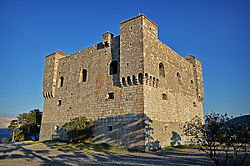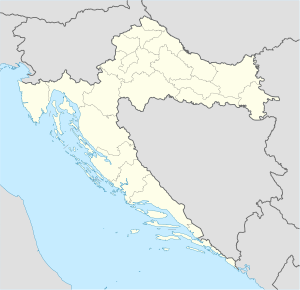Senj
| Senj | ||
|---|---|---|
| Town | ||

|
||
|
||
| Location of Senj within Croatia | ||
| Coordinates: 44°57′N 14°54′E / 44.950°N 14.900°ECoordinates: 44°57′N 14°54′E / 44.950°N 14.900°E | ||
| Country |
|
|
| County |
|
|
| Government | ||
| • Mayor | Darko Nekić (HDZ) | |
| Area | ||
| • Town | 658 km2 (254 sq mi) | |
| Elevation | 0 m (0 ft) | |
| Population (2011) | ||
| • Town | 7,182 | |
| • Urban | 4,810 | |
| Time zone | CET (UTC+1) | |
| • Summer (DST) | CEST (UTC+2) | |
| Postal code | 53 270 | |
| Area code(s) | 053 | |
| Website | senj.hr | |
Senj (pronounced [sɛ̂ːɲ]) (Italian: Segna, Latin: Senia, German: Zengg) is an old town on the upper Adriatic coast in Croatia, in the foothills of the Mala Kapela and Velebit mountains.
The symbol of the town is the Nehaj Fortress (Croatian: Tvrđava Nehaj) which was completed in 1558. For a time this was the seat of the Uskoks (Italian: Uscocchi), who were Christian refugees from Ottoman Bosnia resettled here to protect the Habsburg borderlands. The Republic of Venice accused the Uskoks of piracy and declared war on them which led to their expulsion following a truce in 1617.
Senj is to be found in the Lika-Senj County of Croatia, the Roman Catholic Diocese of Gospić-Senj and the Roman Catholic Archdiocese of Rijeka.
Senj has apparently been inhabited since prehistoric times. A settlement called Attienities in today's Senj was mentioned in Greek documents dated to 4th century BC. The Illyrian tribe Iapydes were settled around the town.
...
Wikipedia


